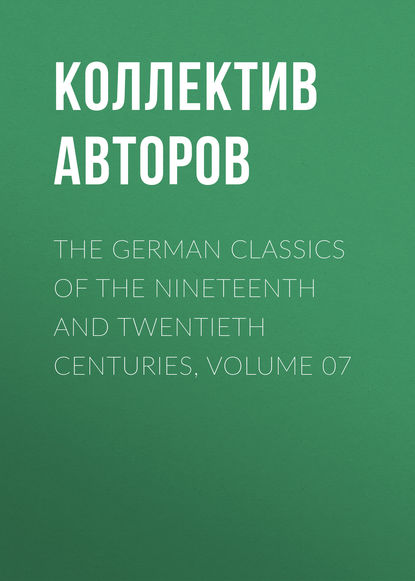По всем вопросам обращайтесь на: info@litportal.ru
(©) 2003-2024.
✖
The German Classics of the Nineteenth and Twentieth Centuries, Volume 07
Настройки чтения
Размер шрифта
Высота строк
Поля
Her lively interest in all the personages whom one could meet at the house of a Ninon, in the centres of cultivation and learning, was nevertheless so modest and so well controlled that she was honored with the friendship of one of the noblest women of the time—Mme. de Sévigné. The Count, after his grandmother's death, had found in an old oaken chest, full of interesting papers, the most charming letters from the Marquise and her daughter.
From the hand of Mme. de Sévigné, indeed, she had received, during a fête at Trianon, the sprig from an orange-tree, which she had planted and which became in Germany a flourishing tree. For perhaps twenty-five years it grew under her care, and afterward was treated with the greatest solicitude by children and grandchildren. Prized for its own actual worth, it was treasured the more as the living symbol of an age which, intellectually, was then regarded as little less than divine—an age in which we, today, can find little that is truly admirable, but which was preparing the way for events, only a few years distant from our innocent story, which shook the world.
To the bequest of her excellent ancestor Eugenie showed much devotion, and her uncle had often said that the tree should some day belong to her. The greater was her disappointment then, when, during her absence in the preceding spring, the leaves of the precious tree began to turn yellow and many branches died. The gardener gave it up for lost, since he could find no particular cause for its fading, and did not succeed in reviving it. But the Count, advised by a skilful friend, had it placed in a room by itself and treated according to one of the strange and mysterious prescriptions which exist among the country folk, and his hope of surprising his beloved niece with her old friend in all its new strength and fruitfulness was realized beyond expectation. Repressing his impatience, and anxious, moreover, lest those oranges which had ripened first should fall from the tree, he had postponed the surprise for several weeks, until the day of the betrothal; and there is no need of further excuse for the good man's emotion, when, at the last moment, he found that a stranger had robbed him of his pleasure.
But the Lieutenant had long before dinner found opportunity to arrange his poetical contribution to the festive presentation, and had altered the close of his verses, which might otherwise have been almost too serious. Now he rose and drew forth his manuscript, and, turning to Eugenie, began to read.
The oft-sung tree of the Hesperides—so ran the story—sprang up, ages ago, in the garden of Juno on a western island, as a wedding gift from Mother Earth, and was watched over by three nymphs, gifted with song. A shoot from this tree had often wished for a similar fate, for the custom of bestowing one of his race on a royal bride had descended from gods to mortals. After long and vain waiting, the maiden to whom he might turn his fond glances seemed at last to be found. She was kind to him and lingered by him often. But the proud laurel (devoted to the Muses), his neighbor beside the spring, roused his jealousy by threatening to steal from the talented beauty all thought of love for man. In vain the myrtle comforted him and taught him patience by her own example; finally the absence of his beloved increased his malady till it became well-nigh fatal.
But summer brought back the absent one, and, happily, with a changed heart. Town, palace, and garden received her with the greatest joy. Roses and lilies, more radiant than ever, looked up with modest rapture; shrubs and trees nodded greetings to her; but for one, the noblest, she came alas! too late. His leaves were withered, and only the lifeless stem and the dry tips of his branches were left. He would never know his kind friend again. And how she wept and mourned over him!
But Apollo heard her voice from afar, and, coming nearer, looked with compassion upon her grief. He touched the tree with his all-healing hands. Immediately the sap began to stir and rise in the trunk; young leaves unfolded; white, nectar-laden flowers opened here and there. Yes—for what cannot the immortals do-the beautiful, round fruits appeared, three times three, the number of the nine sisters; they grew and grew, their young green changing before his eyes to the color of gold. Phoebus—so ended the poem—
Phoebus, in his work rejoicing,
Counts the fruit; but, ah! the sight
Tempts him. In another moment
Doth he yield to appetite.
Smiling, plucks the god of music
One sweet orange from the tree
"Share with me the fruit, thou fair one,
And this, slice shall Amor's be."
The verses were received with shouts of applause, and Max was readily pardoned for the unexpected ending which had so completely altered the really charming effect which he had made in the first version.
Franziska, whose ready wit had already been called out by the Count and Mozart, suddenly left the table, and returning brought with her a large old English engraving which had hung, little heeded, in a distant room. "It must be true, as I have always heard, that there is nothing new under the sun," she cried, as she set up the picture at the end of the table. "Here in the Golden Age is the same scene which we have heard about today. I hope that Apollo will recognize himself in this situation."
"Excellent," answered Max. "There we have the god just as he is bending thoughtfully over the sacred spring. And, look! behind him in the thicket is an old Satyr watching him. I would take my oath that Apollo is thinking of some long-forgotten Acadian dances which old Chiron taught him to play on the cithern when he was young."
"Exactly," applauded Franziska, who was standing behind Mozart's chair. Turning to him, she continued, "Do you see that bough heavy with fruit, bending down toward the god?"
"Yes; that is the olive-tree, which was sacred to him."
"Not at all. Those are the finest oranges. And in a moment—in a fit of abstraction—he will pick one."
"Instead," cried Mozart, "he will stop this roguish mouth with a thousand kisses." And catching her by the arm he vowed that she should not go until she had paid the forfeit—which was promptly done.
"Max, read us what is written beneath the picture," said the Countess.
"They are verses from a celebrated ode of Horace.[32 - Invocation to Calliope, Bk. III, Ode IV.] The poet Ramler, of Berlin, made a fine translation of them a while ago. It is in most beautiful rhythm. How splendid is even this one passage:
"—And he, who never more
Will from his shoulders lay aside the bow,
Who in the pure dew of Castalia's fountain
Laves loosened hair; who holds the Lycian thicket
And his own native wood—
Apollo! Delian and Pataréan King."
"Beautiful!" exclaimed the Count, "but it needs a little explanation here and there. For instance, 'He who will never lay aside the bow,' would, of course, mean in plain prose, 'He who was always a most diligent fiddler.' But, Mozart, you are sowing discord in two gentle hearts."
"How so?"
"Eugenie is envying her friend—and with good reason."
"Ah! you have discovered my weak point. But what would the Herr Baron say?"
"I could forgive for once."
"Very well, then; I shall not neglect my opportunity. But you need not be alarmed, Herr Baron. There is no danger as long as the god does not lend me his countenance and his long yellow hair. I wish he would. I would give him on the spot Mozart's braid and his very best hair-ribbon besides."
"Apollo would have to be careful, in future, how he gracefully laved his new French finery in the Castalian fountain," laughed Franziska.
With such exchange of jests the merriment grew; the wines were passed, many a toast was offered, and Mozart soon fell into his way of talking in rhyme. The Lieutenant was an able second, and his father, also, would not be outdone; indeed, once or twice the latter succeeded remarkably well. But such conversations cannot well be repeated, because the very elements which make them irresistible at the time—the gaiety of the mood and the charm of personality in word and look—are lacking.
Among the toasts was one proposed by Franziska's aunt—that Mozart should live to write many more immortal works. "Exactly! I am with you in that," cried Mozart, and they eagerly touched glasses. Then the Count began to sing—with much power and certainty, thanks to his inspiration:
"Here's to Mozart's latest score;
May he write us many more."
Max.
"Works, da Ponte, such as you
(Mighty Schikaneder, too),"
Mozart.
"And Mozart, even, until now
Never thought of once, I vow."
The Count.
"Works that you shall live to see,
Great arch-thief of Italy;
That shall drive you to despair,
Clever Signor Bonbonnière."
Max.
"You may have a hundred years,"
Mozart.
"Unless you with all your wares,"
All three, con forza.
"Straight zum Teufel first repair,
Clever Monsieur Bonbonnière."

















